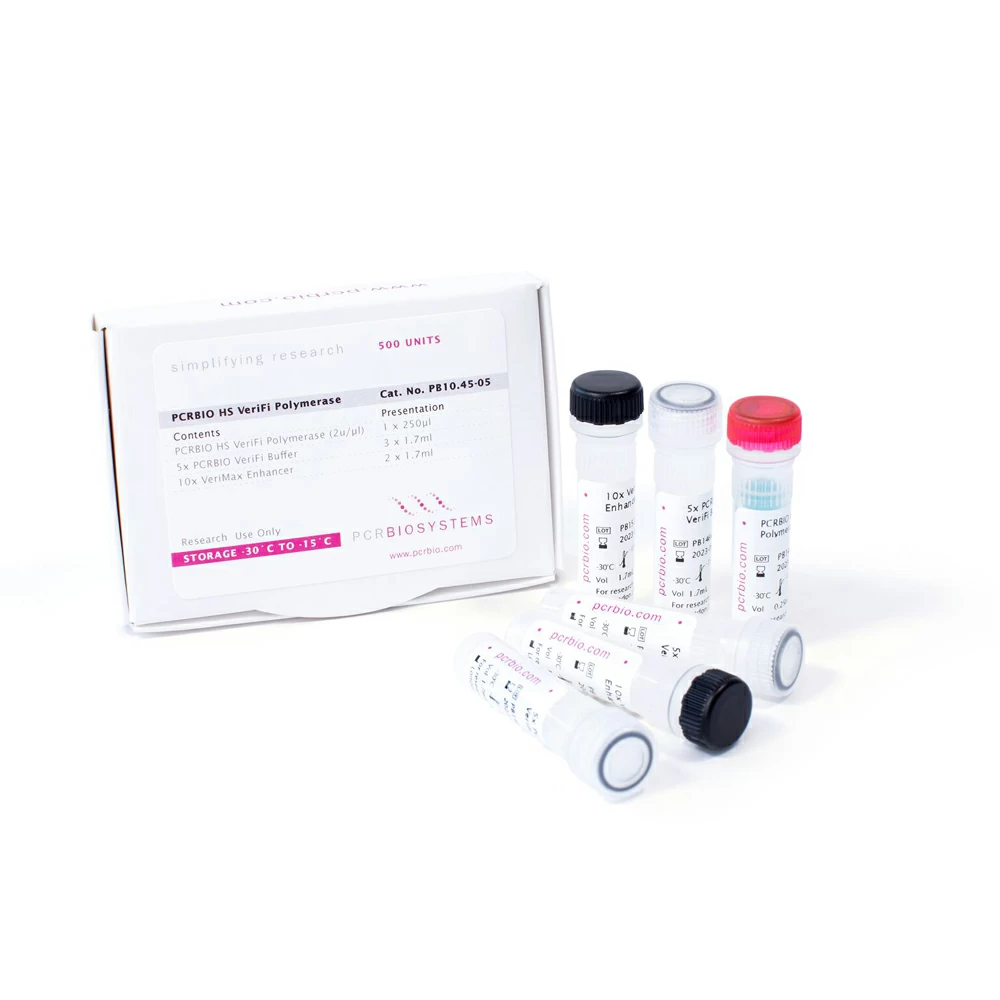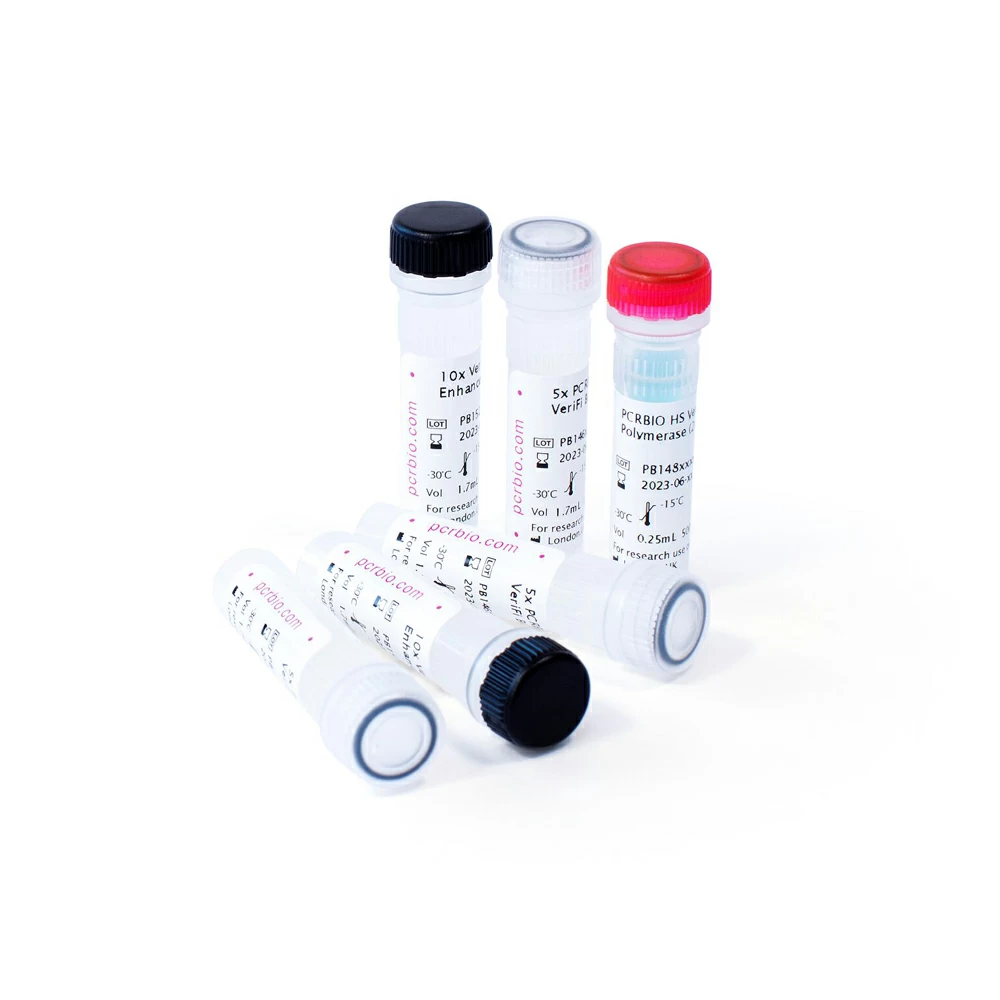Cat #: 17-109B
PCR Biosystems PB10.45-05 VeriFi™ Hot Start Polymerase, High Fidelity, Includes dNTPs, 500U/Unit













Cat #: 17-109B
PCR Biosystems PB10.45-05 VeriFi™ Hot Start Polymerase, High Fidelity, Includes dNTPs, 500U/Unit
High Fidelity, Includes dNTPs
500U/Unit
Brand: PCR Biosystems- Hot start version of PCRBIO Verifi polymerase for maximized sensitivity and specificity
- Suitable for high fidelity PCR, long-range PCR, multiplexing and high-throughput PCR, site-directed mutagenesis, cloning and sequencing
- 100x higher fidelity than Taq DNA polymerase
- Allows greater success with long templates and/or GC or AT-rich templates (17.5kb and over)
- Hot start allows convenient set up of reactions at room temperature
- Reaction mix is stable at room temperature for up to 24 hours both before and after PCR
- High temperature cycling (up to 100°C denaturation) to better separate GC-rich sequences
- Generates blunt-end PCR products

Size
$1,029.10
Login To Access Your Institutional Price
High Fidelity, Includes dNTPs
500U/Unit
Brand: PCR Biosystems- Hot start version of PCRBIO Verifi polymerase for maximized sensitivity and specificity
- Suitable for high fidelity PCR, long-range PCR, multiplexing and high-throughput PCR, site-directed mutagenesis, cloning and sequencing
- 100x higher fidelity than Taq DNA polymerase
- Allows greater success with long templates and/or GC or AT-rich templates (17.5kb and over)
- Hot start allows convenient set up of reactions at room temperature
- Reaction mix is stable at room temperature for up to 24 hours both before and after PCR
- High temperature cycling (up to 100°C denaturation) to better separate GC-rich sequences
- Generates blunt-end PCR products
PCRBIO Hot Start VeriFi polymerase is a high fidelity enzyme derived from Pfu DNA polymerase for it’s 3’-5’ exonuclease (proofreading) activity. This hot start polymerase is able to amplify longer and more difficult targets such as eukaryotic genomic templates up to 17.5kb, and longer for simpler DNA templates. PCRBIO’s innovative AptaLock™ technology uses a proprietary aptamer-like molecule that reversibly inhibits both the 3’-5’ exonuclease activity and 5’-3’ polymerase activity of the enzyme at ambient temperatures. This unique hot start molecule prevents primer dimer formation and nonspecific amplification to maximize the sensitivity and specificity of your PCR. The AptaLock™ technology makes this polymerase highly suitable for multiplexing and allows for reactions to be set up at room temperature.
The enhanced accuracy of PCRBIO Hot Start VeriFi™ Polymerase gives extremely low error rates and fidelity that is approximately 100 times higher than Taq DNA polymerase. The enzyme is ideal for applications where superior accuracy is required, such as cloning, site-directed mutagenesis and sequencing. This advanced PCR polymerase is provided with an advanced buffer system including dNTPs, Mg and enhancers, enabling high fidelity PCR of a wide range of targets and fragment sizes regardless of GC or AT content.
| Packaging | 1 x 50ul HS VeriFi Polymerase, 3 x 1.7ml 5x VeriFi Buffer & 2 x 1.7ml 10x VeriMax Enhancer |
|---|---|
| Quantity | 500U/Unit |
| Storage | Between -30 and -15°C |
| Compare To | NEB Phusion® High Fidelity Polymerase, NEB Q5® High-Fidelity DNA Polymerase, Invitrogen™ AccuPrime™ Pfx DNA Polymerase, KAPA HiFi PCR Kit, |
Yes. If you’re working from bacterial colonies, use a sterile tip to pick a colony and resuspend into the 50µl PCR reaction. If working from liquid culture add 5µl of overnight culture to the final mix. Follow the general protocol and increase the initial denaturation time to 10 min at 95°C.
PCRBIO HS VeriFi Polymerase contains the innovative AptaLock™ technology which minimizes unwanted reactivity at room temperature and makes this product suitable for multiplexing. When first performing multiplex PCR, we recommend running an annealing temperature gradient from 55°C to 65°C. The annealing temperature that results in the best specificity should be used in subsequent experiments. The optimal extension time for multiplex reactions will be dependent on the complexity of template, the length of amplicons, and the number of targets. We recommend starting with the extension time of the longest fragment, and then increasing in increments of between 10 and 30 seconds if necessary. For example, for the multiplex reaction shown on the website (10-plex with fragments from 139bp and 962bp), a 90 second extension time was used. Fast cycling conditions should not be used for multiplex PCR. Thanks to AptaLock™ hot start technology, there is no need to set up reactions on ice or cooling blocks from start till finish. Primers must be designed carefully to avoid overlapping sequences as much as possible while maintaining diverse amplicon lengths that can be easily analyzed with your end-detection method.
Enjoy our products? Leave a review and let us know.


 Can PCRBIO HS VeriFi Polymerase be used for colony PCR?
Can PCRBIO HS VeriFi Polymerase be used for colony PCR?